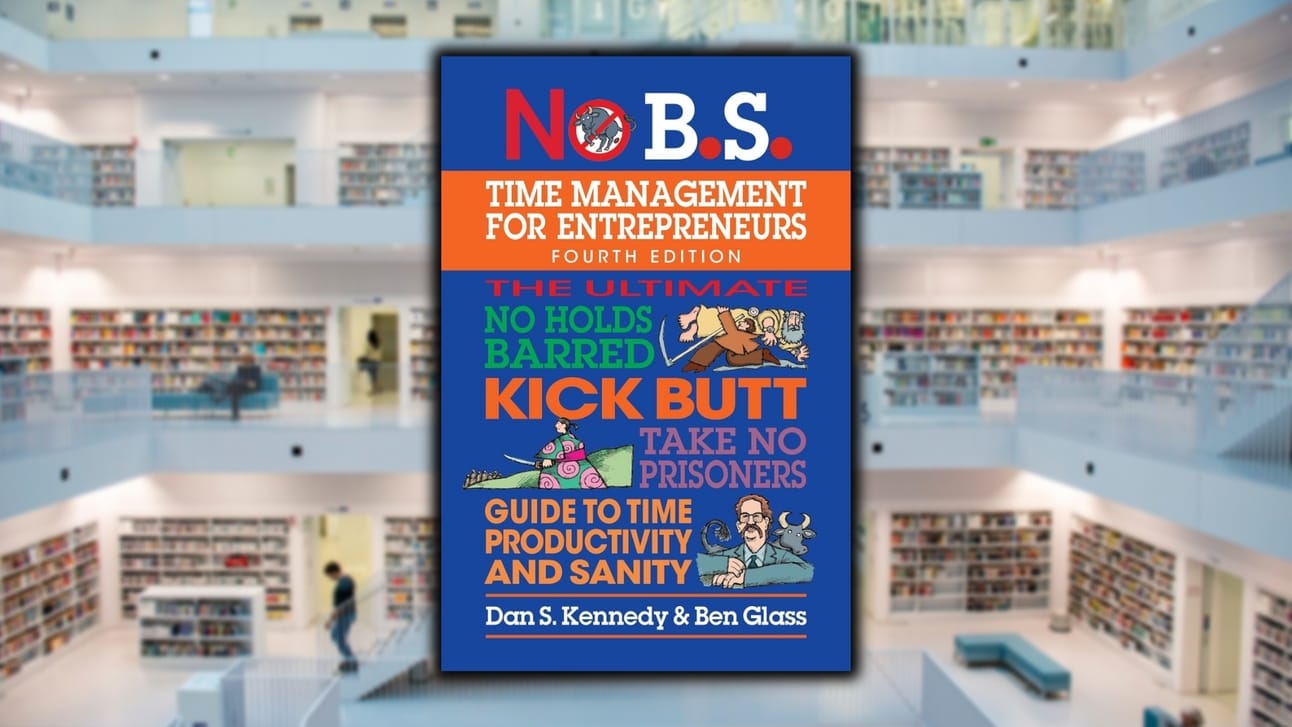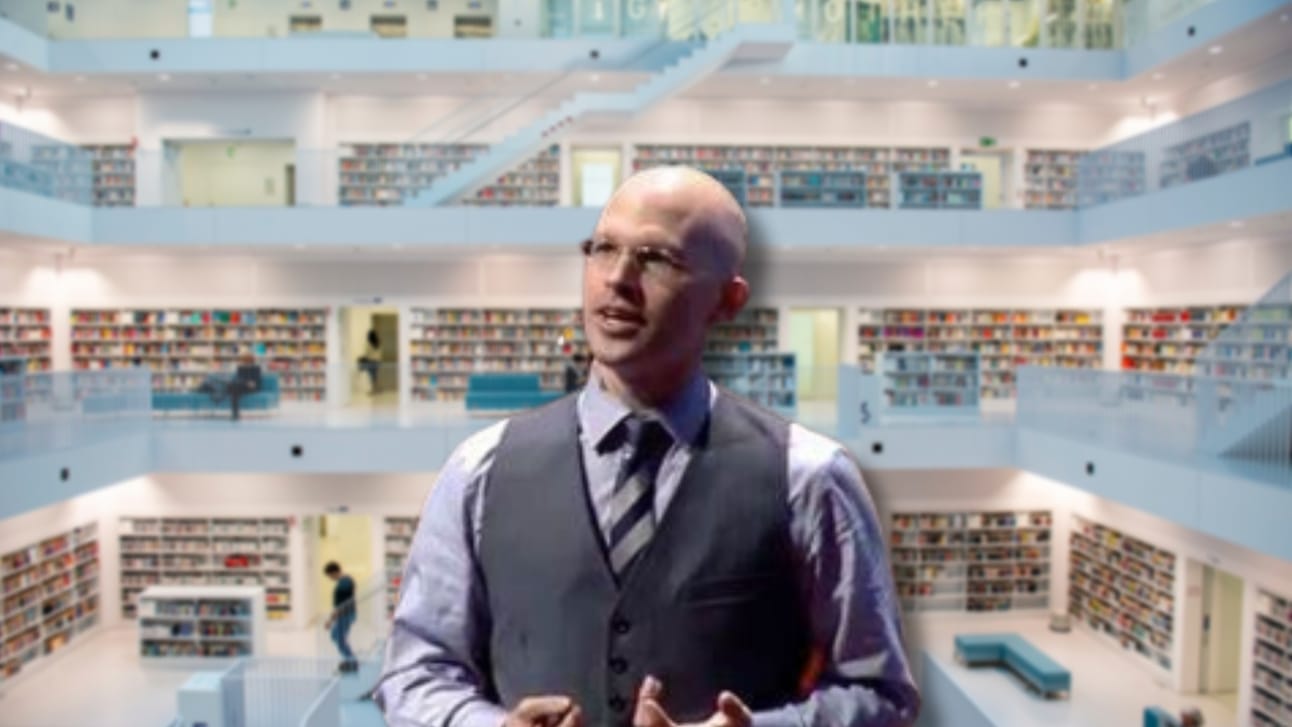“You wasted $150,000 on an education you coulda got for a buck fifty in late charges at the public library.”
“Self-education is, I firmly believe, the only kind of education there is.”
“Clear language engenders clear thought, and clear thought is the most important benefit of education.”
“Business degrees are often a poor investment, but business skills are always useful, no matter how you acquire them.”
“One of the most important things about learning any subject is the fact that you don’t need to know everything – you need to understand a small set of important concepts that provide most of the value. Once you have a solid scaffold of core principles to work from, building upon your knowledge and making progress becomes much easier.”
“Education is not the answer to the question. Education is the means to the answer to all questions.”
“College: two hundred people reading the same book. An obvious mistake. Two hundred people can read two hundred books.”
“Institutions will try to preserve the problem to which they are the solution.”
“The society which scorns excellence in plumbing as a humble activity and tolerates shoddiness in philosophy because it is an exalted activity will have neither good plumbing nor good philosophy: neither its pipes nor its theories will hold water.”
“When your work speaks for itself, don’t interrupt.”
Calls to Action: “If you think you’re being too obvious, you’re doing it right.”
“If you want an audience, start a fight.”
“We confess our little faults to persuade people that we have no large ones.”
“Sometimes, when I consider what tremendous consequences come from little things, I am tempted to think: there are no little things.”
“Don’t compete with rivals - make them irrelevant.”
“Profit margin is the difference between how much revenue you capture and how much you spend to capture it, expressed in percentage terms.”
Profit Margin Equation: ((Revenue – Cost) / Revenue) x 100 = % Profit Margin
“If you would know the value of money, go try and borrow some.”
“Improve by 1% a day, and in just 70 days, you’re twice as good.”
“Good books, magazines, blogs, documentaries, and even competitors are valuable if they violate your expectations about what’s possible. When you discover that other people are doing something you once considered unrealistic or impossible, it changes your Reference Levels in a very useful way. All you need to know is that something you want is possible, and you’ll find a way to get it.”
“The People’s Theatre, what nonsense! Call it the Aristocrat’s Theatre, and the people will come.”
“Human beings, who are almost unique in having the ability to learn from the experience of others, are also remarkable for their apparent disinclination to do so.”
“The more attractive an option looks in terms of status, the more likely it is to have significant drawbacks or pitfalls (given extreme competition for that status), and the more likely you are to ignore or undervalue those drawbacks and pursue that option anyway.”
“There are millions of ways to get better results in important areas of life if you’re willing to ignore alluring distractions and focus on doing what works.”
“Because protective mode is physiological, it’s often best to use physiological means to calm yourself down. Exercise, sleep, and meditation can help calm your mind by metabolizing or counteracting the stress hormones that have been flooding your body. When you’re feeling overwhelmed, going for a quick run or lifting weights can do wonders for your state of mind.”
“In general, we are least aware of what our minds do best.”
“To think is easy. To act is difficult. To act as one thinks is the most difficult.”
“Rule your mind, or it will rule you.”
“Delegation is effective for anything another person can do 80 percent as well as you can.”
“Setting a vague goal is like walking into a restaurant and saying, ‘I’m hungry. I want some food.’ You’ll stay hungry until you order something.”
“Fuzzy goals like ‘I want to climb a mountain’ aren’t very helpful because they don’t give your brain any material to work with. Which mountain? Where? When? Why? Without answers to these questions, you probably won’t do anything at all.”
“Once you make a conscious decision to achieve the goal, your mind starts finding ways to get it done.”
“I may not have gone where I intended to go, but I think I have ended up where I intended to be.”
“‘Being happy’ is not an achievement – it’s a quality of your present experience. States of Being are decision criteria, not goals. It’s okay to want to ‘be happy’ or ‘be successful,’ but treating these desires as goals is a recipe for frustration.
Instead of treating these states as achievements, it’s far better to think of them as decision criteria – ways of understanding whether or not your actions are leading to your desired results.”
“Take some time to prime your brain to notice what’s important to you, and you’ll find it.”
“Go as far as you can see; when you get there, you’ll be able to see farther.”
“If we attend continually and promptly to the little that we can do, we shall ere long be surprised to find how little remains that we cannot do.”
“Don’t ask the barber if you need a haircut.”
“The important work of moving the world forward does not wait to be done by perfect men.”
“All complex systems that work evolved from simple systems that worked.”
“Those who will not face improvements because they are changes will face changes that are not improvements.”
“Everyone generalizes from one example. At least, I do.”
“A danger foreseen is half avoided.”
There's always a way to succeed in life, no matter who you are or where you come from, but you're never going to find it by following the herd. If the herd knew how to achieve success and get everything they ever wanted, you wouldn't need this book.
Sample Quotes from the Book:
“Give up forced ‘positive thinking’ or ‘motivation’; instead, build a solid foundation of strong self-image, well-defined goals, practical plans, and know-how that naturally produce positive expectancy, initiative, and follow-through. Cultivate REASONED optimism. Have something tangible to believe in and to be excited about - not just excitement itself.”
“In fact, some excellent career or business advice is to pick endeavors because of the type of person the endeavors will force you to become.
An early mentor used to urge people of very limited financial means to commit to the goal of becoming a millionaire, not so much for the money, he explained, but because of the people they would have to become, the positive characteristics and behaviors they would have to develop in order to achieve the financial benchmark.
He was widely misunderstood on this point and perceived by some to be a preacher of greed. What he meant, simply, was:
Big commitment to big goals build big people.”
“College graduates, on average, out-earn non-college graduates by six figures to, at most, a million dollars, lifetime. That IS an argument in favor of a college education, although a million dollars divided over 40 to 60 years of active work is not as gigantic as it sounds stated as a lump sum.
Look closer and here is what you will discover: If college actually prepares you for anything, it is for a job. College does not prepare you to be entrepreneurial, and it certainly does not prepare you to get rich.”
Read the Full Breakdown: No B.S. Guide to Succeeding in Business by Breaking All the Rules, by Dan S. Kennedy
In this book, the eccentric entrepreneur Dan S. Kennedy shares the extreme time management strategies he uses personally to run his multimillion-dollar company, all while successfully safeguarding his schedule and his sanity.
Sample Quotes from the Book:
“There’s a reason why you can’t find a wall clock in a casino to save your life - those folks stealing your money do not want you to be aware of the passing of time.
And that tells you something useful right there: you want to be very aware, all the time, of the passing of time. It is to your advantage to be very conscious of the passage and usage of minutes and hours.”
“Just as the person who cannot tell you where his money goes is forever destined to be poor, the person who cannot tell you where his time goes is forever destined to be unproductive - and, often, poor.”
“This tells you a lot about what you must do in order to achieve maximum success, derive maximum value from your time, and lead the happiest possible life:
You must systematically, aggressively divest yourself of those activities you do not do well and do not do happily, or you must find routine, so as to systematically invest your time (and talent, knowledge, know-how, and other resources) in those things you do extraordinarily well, enjoy doing, and find intellectually stimulating.
I have just described for you a formula for peak personal productivity, as a specialist. And you ought to note that, in every field of enterprise, specialists out-earn generalists ten to one.”
Read the Full Breakdown: No B.S. Time Management for Entrepreneurs, by Dan S. Kennedy
Almost everything you're doing now is a distraction preventing you from making a 10X leap - in revenue, leadership ability, significance, and more. Exponential transformations are actually easier than these small little 2X improvements, and Dr. Benjamin Hardy will prove it to you here in this book.
Sample Quotes from the Book:
“Going 10x means you’re living based on the most intrinsic and exciting future you can imagine. That 10x future becomes your filter for everything you do, and most of your current life can’t make it through that 10x filter.”
“In all aspects of life, the competition is highest for average goals. Not only is the competition highest, but the excitement is lowest and the pathway forward is dramatically more complex and confusing with small and linear goals.
With unrealistic, impossible, or ‘10x’-level goals, the competition is lowest, the excitement is highest, and the pathway forward becomes simple and nonlinear. You stop following the crowd. You shift toward quality rather than quantity and stop competing with anyone.”
“To make a goal effective, you’ve got to test its outer-limits. Push it out as far as you can. Only once you make your goal impossible will you stop operating based on your current assumptions and knowledge.”
Read the Full Breakdown: 10X Is Easier Than 2X, by Dr. Benjamin Hardy

The View from the Opposition:
No one's ideas are beyond questioning. In this section, I argue the case for the opposition and raise some points you might wish to evaluate for yourself while reading this book.
#1: The Pros and Cons of MBA Programs
The following is from Josh Kaufman himself, and it should serve to clarify any confusion surrounding his position on business schools, MBA programs, and the like.
He would also agree with me that reading a book about business is no substitute for actually getting out there and working to solve problems in the real world.
You're going to learn so much more from actually running a business than you ever will from just reading about running a business. But hey, here's Josh:
"The Personal MBA was created to expose you to a core set of advanced business concepts quickly and effectively. By design, it does not include everything you might come across in business school. If you’re looking for a detailed analysis of the Black-Scholes option pricing model and its relationship to the volatility surfaces of certain financial derivatives, you’re going to be very disappointed.
The Personal MBA focuses on knowledge that you’ll find useful in the real world, not what an academic professor personally finds interesting.
For the sake of brevity, here’s a short Q&A on the pros and cons of business school:
*Can a traditional MBA program help you? Yes. You’ll meet a lot of great people and get acquainted with a few professors and corporate HR recruiters who can help you land a new job. In exchange, you will go deep into debt. If you decide to enroll in a full-time MBA program, you must also consider the opportunity cost of lost wages and long-term investable savings.
*Will a traditional MBA teach you anything you can’t learn by yourself? Probably not. Classroom discussion can be beneficial, but there’s nothing presented in a traditional MBA program that you can’t learn by studying a few good books on the subject. Remember, the value of traditional MBA programs is not in the learning: the primary benefit is the connection to recruiters and other students.
*Is a traditional MBA worth my time and money? Unfortunately, there’s no universal answer. If you’re looking to go into advanced corporate accounting, finance, quantitative analysis, commercial real estate, Fortune 500 management consulting, venture capital, or investment banking, an MBA or MS in a business-related field may be expected or required. In those cases, caveat emptor: once you decide to attend a traditional business school, the only certainty is that you’ll be up to your eyeballs in debt for a few decades.
To clarify, here’s what I’m not saying about traditional MBA programs:
*I’m not saying “MBA programs are completely worthless and an abject waste of time and money.” If you’re aiming for a job at a Fortune 500 company in an industry in which you have no experience, you want to work for a company that directly rewards MBA graduates with higher pay or increased responsibility, or your employer is willing to pay the full cost of tuition, it may make sense to enroll in an MBA program. If you’re an entrepreneur or middle manager at a company you like, your limited time and energy is probably best spent working on your business and learning on your own.
*I’m not saying “You won’t learn anything useful in an MBA program.” Like any other life experience, what you learn is primarily determined by how much energy and attention you choose to devote to the program. You can learn many useful things in an MBA program - you just won’t learn anything you can’t learn elsewhere more completely / quickly / inexpensively, and you’ll waste a lot of time on things that simply aren’t that important.
*I’m not saying “People who enroll in MBA programs are stupid.” Prospective MBA students tend to be intelligent, driven, and ambitious, which are major assets. The irony is that the most promising MBA candidates are just as likely to succeed in business without an MBA as they are with the diploma. According to Dr. Jeffrey Pfeffer, professor of organizational behavior at Stanford GSB, 'If you are good enough to get in, you obviously have enough talent to do well, regardless.'"
"The test of a first-rate intelligence is the ability to hold two opposed ideas in the mind at the same time and still retain the ability to function.”
The quality of your questions determines the quality of your life. That's also how you get the absolute most out of any book that you decide to read:
You ask great questions the whole time - as though the book was on trial for its life.
Here in this section are a few questions that can help guide and stimulate your thinking, but try to come up with your own additional questions, especially if you decide to read this book the whole way through...
#1: "What is business school going to teach me that I can't learn from a book instead? Is the tradeoff worth it? To whom?"
#2: "How large does my business have to be before I can label myself 'successful'? Now that I have this end point in mind, is it going to be easier to stop once I get there? How can I stop myself from moving the goalposts once I achieve my initial goals?"
#3: "What problem is my business solving? Is there another product or service currently on the market that solves this problem better or more efficiently than I can? What do they have that I don't?"
#4: "Which tasks reside in my 'zone of genius,' and which tasks are better left to be done by someone else? Have I delegated, deferred, or deleted enough of my non-essential tasks so that I can get down to work on what really matters?"
#5: "Am I in danger of burning out? Do I have systems in place for recovery, and am I prioritizing health and vitality in my day-to-day life? What can I do to become the kind of businessperson or entrepreneur that my company needs?"
"Judge a man by his questions, rather than by his answers."
So you've finished reading. What do you do now?
Reading for pleasure is great, and I wholeheartedly support it. However, I am intensely practical when I'm reading for a particular purpose. I want a result. I want to take what I've learned and apply it to my one and only life to make it better!
Because that's really what the Great Books all say. They all say: "You must change your life!" So here, below, are some suggestions for how you can apply the wisdom found in this breakdown to improve your actual life.
Please commit to taking massive action on this immediately! Acting on what you've learned here today will also help you solidify it in your long-term memory. So there's a double benefit! Let's begin...
#1: Question Higher Education
There are plenty of fine reasons for going to business school (networking, credibility, access to mentors, etc.), and plenty of reasons why it may not be the best choice for you.
For one thing, it’s an awful lot of student debt to take on, simply to learn the few important things that Kaufman doesn’t cover in his book. Seriously, most of what you need is in that book, and you can get it basically for free.
Still, it’s important to reflect on your true motivations. Do you want to be a consultant, a banker, or to work on Wall Street? If so, then you’re probably best served by going to business school. At least, it wouldn’t be the worst idea.
But if you’re still just “figuring things out,” then $200,000+ is a pretty hefty price tag for something like that. There’s nothing "wrong" with taking time to sort out your priorities (indeed, people don’t do enough of this kind of long-range thinking!), but if you already know that you want to start your own business, crippling debt is the last thing you need.
#2: Seek Out Ways to Deliver Value
Every problem is also a business opportunity. Nobody’s life is perfect, and until everyone’s life is perfect, we’ll still need entrepreneurs, businesses, and solutions to life’s inevitable problems. Entrepreneurs provide those valuable solutions, and to the extent that you can add value to people’s lives, you will be rewarded financially (and in many other ways).
So, constantly be on the lookout for problems you can solve, and for ways that you can make the lives of the people around you better. There is a business opportunity hidden within every difficulty, and a customer within every sufferer.
#3: Develop Economically Valuable Skills
If you recall the five core processes of every business (Key Idea #1), you’ll see that the people who can make each of those processes run more smoothly and efficiently possess economically valuable skills that the market will reward them for deploying.
Operating within the value creation, marketing, sales, value delivery, and financial processes making up every company are the highest-paid earners in our economy. They have developed economically valuable skills - talents and abilities that the market desperately needs - and so they are paid more than most people.
You can develop these skills too. You don’t need to develop all five at once, but if you have at least one of them, or maybe even some unique combination of two or more, then you will be rewarded extremely well.
"The path to success is to take massive, determined action.”
Josh's research focuses on business, entrepreneurship, skill acquisition, productivity, creativity, applied psychology, and practical wisdom. His unique, multidisciplinary approach to business mastery and rapid skill acquisition has helped millions of readers around the world learn essential concepts and skills on their own terms.
Josh has been featured as the #1 bestselling author in Business & Money, as ranked by Amazon.com, and his books have sold over a million copies worldwide.
Josh's TEDx talk on The First 20 Hours is one of the top 25 most-viewed TED talks published to date, with over 22 million views on YouTube.
Josh's research has been featured by The New York Times, The BBC, The Wall Street Journal, The Atlantic, Fortune, Forbes, Time, BusinessWeek, Wired, Fast Company, Financial Times, HarvardBusiness.org, The World Economic Forum, Inside Higher Ed, Lifehacker, MarketWatch, The Independent, Bloomberg TV, PBS Next Avenue, CCTV, and CNN's Sanjay Gupta MD.
JoshKaufman.net was named one of the "Top 100 Websites for Entrepreneurs" by Forbes in 2013.
Additional Resources:
This Book on Amazon:
If You Liked This Book:
How to Fight a Hydra: Face Your Fears, Pursue Your Ambitions, and Become the Hero You Are Destined to Be, by Josh Kaufman
The Lean Startup: How Today's Entrepreneurs Use Continuous Innovation to Create Radically Successful Businesses, by Eric Ries
Losing My Virginity: How I Survived, Had Fun, and Made a Fortune Doing Business My Way, by Sir Richard Branson
Forward this to a friend you think would love this book!
If you were sent this breakdown, click here to subscribe.
To read past editions of The Reading Life, click here.
Click here to recommend The Reading Life on Twitter (X).
OK, that’s it for now…
More excellent book recommendations coming your way soon!
With that said, I hope you enjoyed this edition of The Reading Life, and enjoy the rest of your week!
Until next time…happy reading!
All the best,
Matt Karamazov
P.S. Whenever you're ready, here are three more ways I can help you:
Work with me personally to scale your business past $5K per month and experience the intoxicating freedom of finally being in control of both your time and your income. High-performers only.
Become a Premium Member of The Reading Life and enjoy unlimited access to 150+ Premium Book Breakdowns, my complete notes from 1,300+ books, exclusive discounts, monthly donations made on your behalf to an incredible literacy charity, and more!
Join Creator Launch Academy, my private business mastermind for creators looking to add at least $1,000/month to their revenue and save at least 20+ hours of productive time each and every week.

















